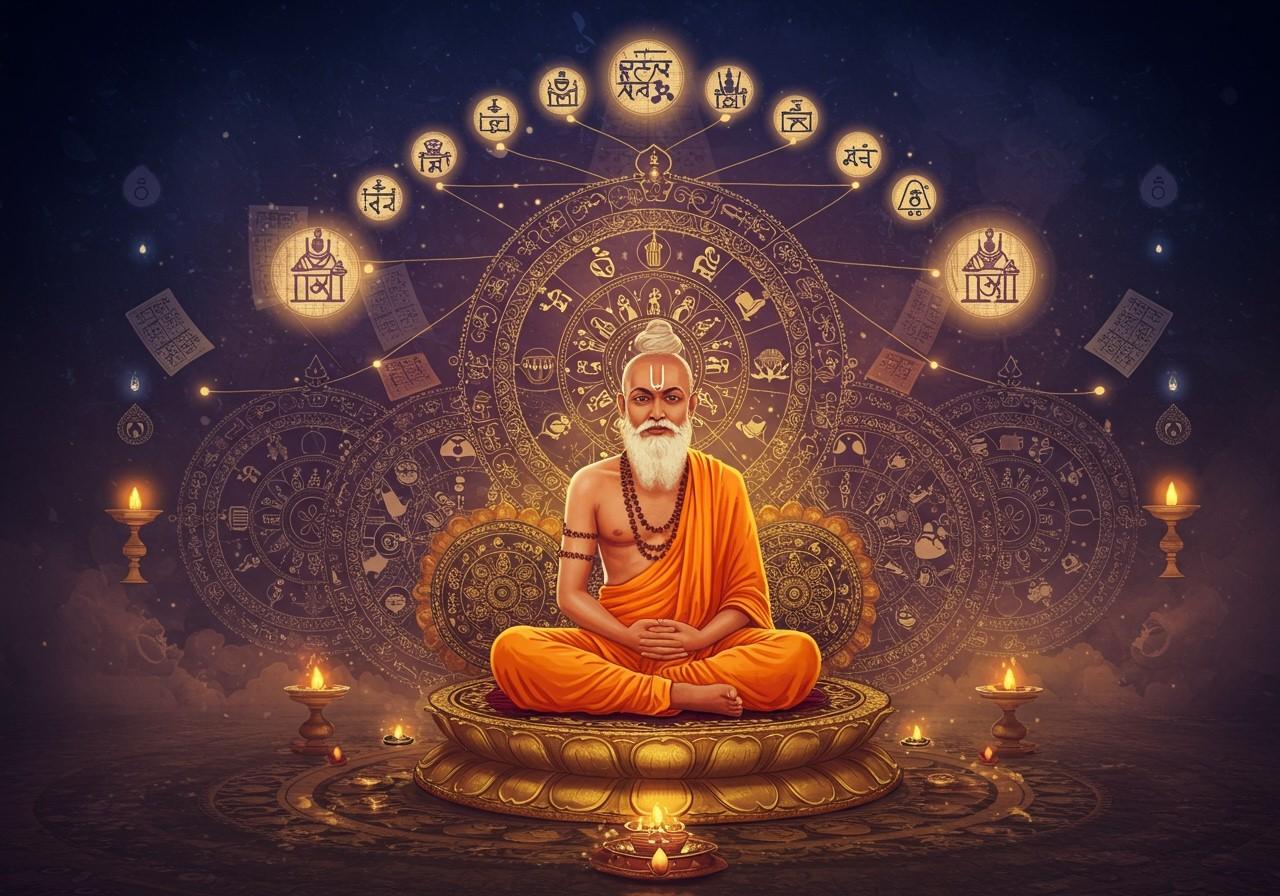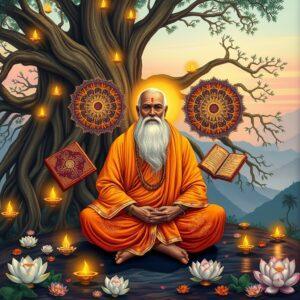
The Mimamsa Philosophy of Karma, originating from ancient India, centers around action, ritual, and their consequences. Grounded in the Vedic tradition, Mimamsa provides a deep analysis of how human actions and rituals influence destiny. This article delves into the core principles of Mimamsa’s karma theory, exploring the nature of karma, its implications, and the role of rituals. For up-to-date information, refer to search results about Karma Mimansa, its role in the Rig Veda, and its emphasis on analyzing Vedic texts.
Understanding Karma Mimamsa
Karma Mimamsa delves into the nature and effectiveness of actions (karma) as prescribed in the Vedas. The term ‘Mimamsa’ itself translates to ‘reflection’ or ‘investigation’. This philosophy emphasizes dharma (duty) and the meticulous performance of rituals. Central to Mimamsa is the concept of ‘apūrva’, an unseen force generated by performing rituals, believed to bring about desired outcomes. Rituals are seen as possessing inherent power, independent of divine intervention. The correct execution of Vedic rituals and precise pronunciation of mantras are considered crucial. Karma, according to Mimamsa, influences both present and future experiences. Karma Mimansa is one of the structuring dynamics of Rk Veda, emphasizing the analyzing quality in structuring Vedic texts. It involves the examination of Vedic texts and refers to a school of Hindu philosophy known as Pūrva Mīmāṃsā or Karma-Mīmāṃsā. This philosophy centers around the performance of duties and actions (karma) aligned with the sacred teachings of the Vedas, viewing liberation in terms of these actions. In Mimamsa, actions are seen as dynamic forces that bring about change in the world, governed by the laws of karma and dharma.
Mimamsa Theory of Karma
The Mimamsa theory explains the connection between actions and their results (karmaphala). It posits that the results are dependent on the nature of the performed rituals. Both physical actions and mental intentions contribute to the accumulation of karma. ‘Nitya’ (daily) and ‘naimittika’ (occasional) rituals are believed to maintain cosmic order and personal well-being. Mimamsa asserts that karma continues across lifetimes, impacting one’s spiritual journey. The individual (purusha) plays a vital role in performing rituals, highlighting personal effort and responsibility. Mimamsa rejects the concept of divine intervention, emphasizing self-reliance.
Does Mimamsa Believe in God?
Mimamsa regards the Vedas as eternal and self-sufficient, negating the need for a creator deity. The power to produce results resides in the rituals and mantras themselves, rather than in divine will. The efficacy of rituals is considered inherent, not dependent on divine grace. Deities are viewed as symbolic within rituals, not as omnipotent beings. This perspective empowers practitioners through self-discipline and personal effort. Mimamsa offers a critique of theistic philosophies that attribute outcomes to divine intervention. Applying Mimamsa principles can empower individuals in contemporary practices.
Implications of Mimamsa Karma
Mimamsa’s emphasis on rituals and duty encourages a disciplined way of life. Actions are performed to fulfill one’s dharma, rather than for personal gain. Shared ritual practices foster a sense of community and collective responsibility. The meticulous performance of rituals is believed to lead to self-improvement and spiritual growth. Mimamsa plays a significant role in preserving cultural traditions within modern Indian society. Its principles can inform sustainable living and ethical conduct. Structured ritual practices promote mental well-being and resilience.
Rituals and Practices in Mimamsa
Specific rituals hold great importance in Mimamsa. ‘Yajna’ (sacrificial rituals) are believed to maintain cosmic balance. ‘Sandhyavandanam’ (daily prayers) are significant in Mimamsa tradition. ‘Agnihotra’ (fire rituals) are performed for purification. ‘Upasana’ (worship) and ‘japa’ (mantra repetition) aid in achieving spiritual goals. Listening to Vedic recitations (‘shravana’) and self-study (‘svadhyaya’) are also considered essential practices. These rituals involve meticulous preparation using specific materials and precise recitations.
How Poojn.in Supports Your Karmic Journey
Poojn.in provides a wide range of products to support your practice of Karma Mimamsa:
-
Complete Puja Samagri Kits: Poojn.in offers pre-assembled kits containing all the necessary items for karma-based rituals and ceremonies, ensuring convenience and completeness. Learn more about the significance of Hindu rituals.
-
Pure Ingredients: Source authentic materials like kumkum, roli, akshat, and other essential ritual items directly from trusted suppliers, guaranteeing purity and quality for your practices. Explore our range of pure camphor.
-
Sacred Texts: Deepen your understanding of karma philosophy and proper ritual procedures with our collection of books and guides. Discover our selection of sacred texts.
-
Ritual Tools: Find traditional items like kalash, puja thali, and other accessories essential for performing karma-based ceremonies. Browse our collection of ritual tools.
Visit www.poojn.in to explore our complete selection. We offer pan-India delivery with secure packaging to preserve the sanctity of all items. Explore the concepts of Dharma and Karma in Hinduism.
Conclusion
The Mimamsa Philosophy of Karma illuminates the profound impact of our actions and rituals. By understanding and applying these ancient teachings, we can cultivate a disciplined, ethical, and spiritually fulfilling life. Mimamsa empowers us to take responsibility for our actions and leverage the power of rituals to shape our destiny. Embracing these practices helps preserve our cultural heritage while fostering mental well-being and resilience.


